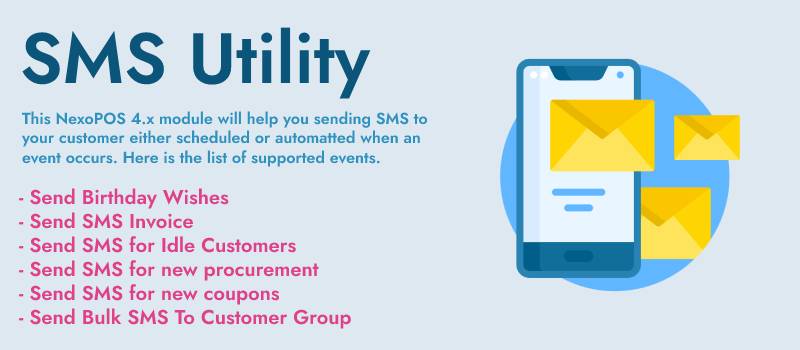Mail: [email protected]
Phone: +1(424)231-4091
SMS Utility
If you already have purchased the product, you can download it from your account downloads.
Version v5.2.0
Download 49
Last Update Apr 8, 2025
SMS Utility is a marketing tool that helps you reach your customer through SMS. This module allows you to create SMS Campaigns that can be automatically sent or scheduled.
Type Of Campaigns
An SMS Campaigns can be scheduled which means it's created and sent at a specific moment to customers belonging to a specific group or automated. Automated campaigns are sent when a specific event occurs in the store. For example, after a sale or new procurement. Here is the list of supported events :
- After a sale
- After a new procurement
- On customer birthday
- On order being delivered
- On sale due or before it turns due
Supported Providers
At the moment the SMS utility supports 3 providers which are :
- Twilio
- Click Send
- Telnyx
We've added the notifications for testing purposes.
Configuring The Module
After the installation, you should choose which provider you would like to use first from the settings added on the Settings menu.
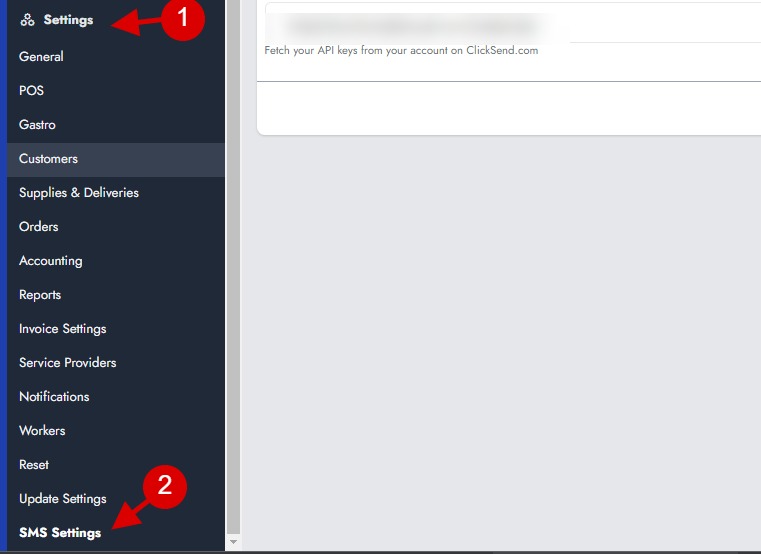
Every provider has his own settings. You'll need to get some API details from your selected provider :
Don't forget to fill in the settings accordingly and save them.
Campaign List
To create a campaign, you need to head to the customers > SMS Campaigns.
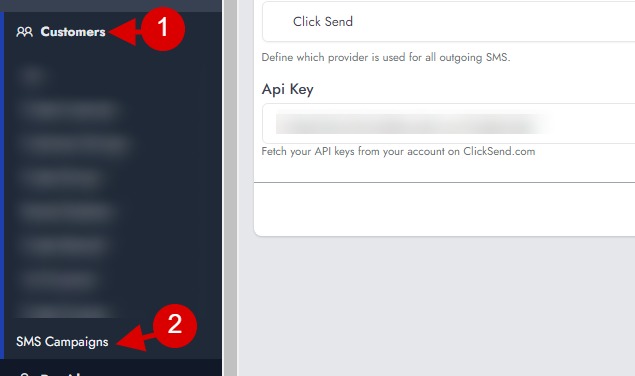
From there, you'll see a list of campaigns that have already been created. Since you're probably creating your first campaign, the table will be empty. Now click on the "+" to create a new campaign.
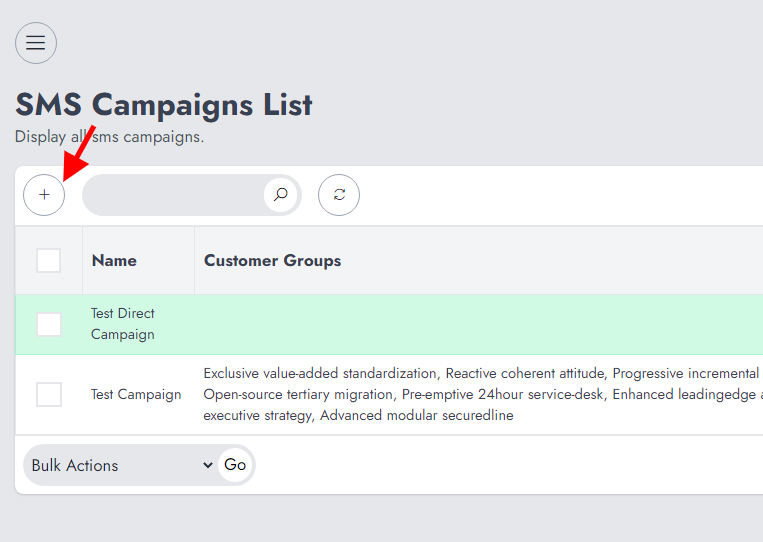
Campaign Creation
The campaign creation has 3 sections :
- The Title
- The Event Manager
- The Campaign Details
While we don't necessarily need to explain how to use the Title section (as it's just for providing the campaign name), we'll see how to use the Event Manager and the Campaign Details.
Event Manager
This is where you'll set up an automated event that will trigger the campaign. You need to click on the right button to unwrap it.
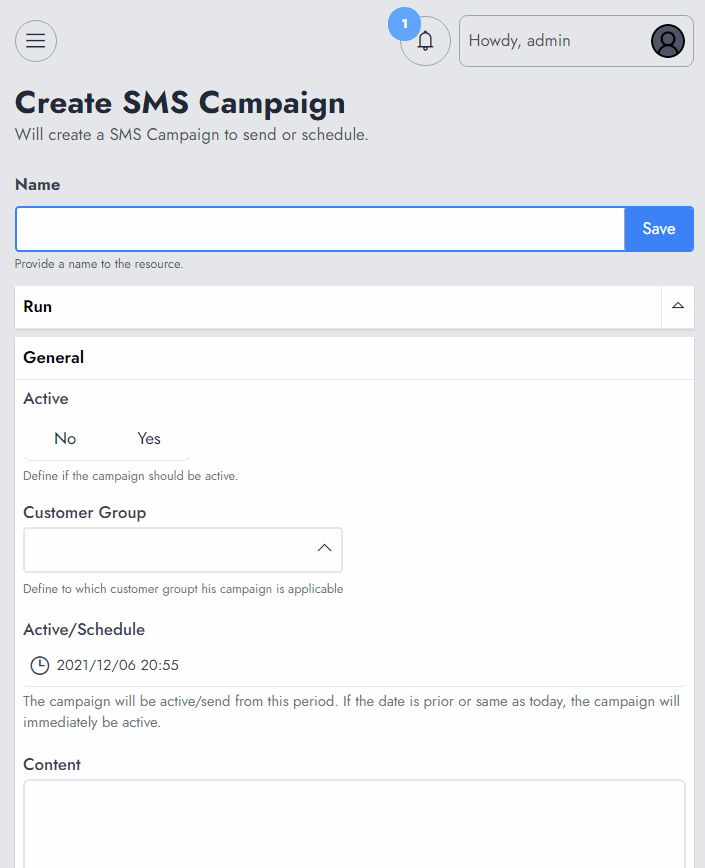
From there, you'll select the event and the value. Note that some event doesn't need a value, so any value provided for such an event will be ignored. From the list of rule, all rule having "X" will use the value provided on the field below.
For example, if you select the rule "X day(s) before sale due" and set 2 on the field "value". The campaign will trigger "2 days before a sale turn due".
Every rule that doesn't have the mention "X" doesn't support value. For example, if you select the rule "On Sale Complete" that will trigger immediately when a sale is complete.
Here is the list of available rules and how they can be used :
- On Sale Complete: This will trigger when an order is paid.
- On Delivery Ongoing: This will trigger when a delivery is ongoing.
- On Sale Due: This will trigger immediately when an order turns due.
- X Day(s) Before Sale Due: Will trigger "X" days before the order turns due. Where "X" is the days set on the value field.
- X Day(s) After Procurement Stocked: Will trigger "X" days after you've received a new inventory.
- X Day(s) Before Birthday: Will trigger "X" days before customer birthday.
- X Day(s) After Idle (No Purchase): Will trigger if the customer doesn't make a purchase after some day.
Note that only one rule can be added at a time. Once you're set click on "Add Rule".
Campaign Details
The campaign details are where you'll define :
- Wether or not the campaign is active
- To which customer group the current campaign applies.
- Schedule the campaign : Note that the schedule button only works if there is no custom rule added.
- Campaign Content : where you write what will be send.

The Campaign Content supports dynamic values. These values are replaced before being sent with the real values. For example #customer_name# will be replaced with the customer name, #order_total# by the order total, etc.
Note that some dynamic values might be available considering the context. Let's say you would like to schedule a birthday wish for your customers. This means that using #order_total# doesn't make any sense as the campaign is not about an order.
All the supported dynamic values are shown below the "Content" textarea.

FAQ
Let's now answer some of the questions you might ask yourself while using this module.
How To Cancel A Scheduled Campaign ?
You just have to edit the campaign and set that as not active.
How To Immediately Send A Direct Campaign
A direct campaign is one that is sent without a schedule. While we rather suggest you use this for testing purposes, you can still use it for your customers. In order to send Direct Campaign, you just need to make sure the schedule is prior to your server date. Make sure to check your timezone on the settings. Alternatively, from the campaign list, on "Direct Campaigns", you'll see a "Send Now" button on the options.
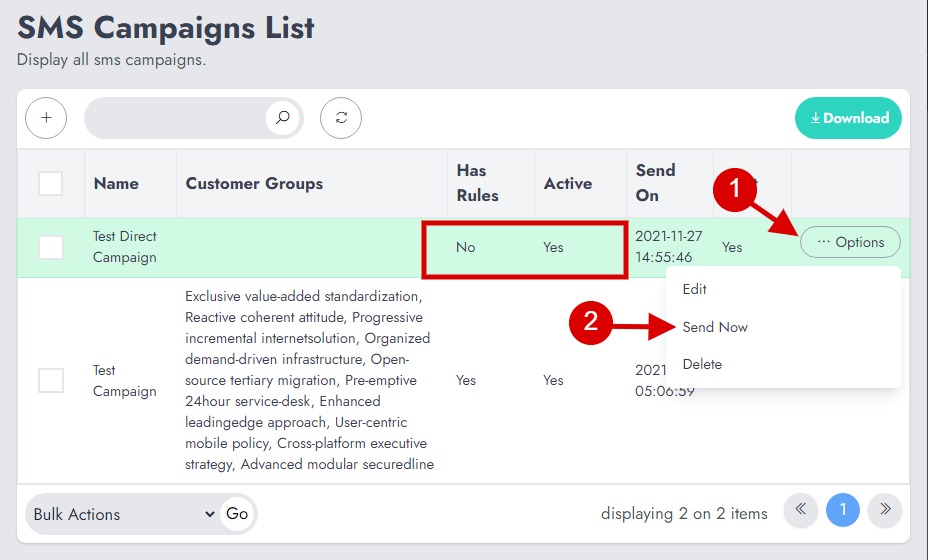
Are you having an issue using this module? Let's us know.
Recommended Modules
$40.00
$0.00
Options Export/Import
Provides a convenient way of exporting modules settings for an...
- v6.0.0
- May 23, 2025
$49.00
WooCommerce Sync for NexoPOS
WooCommerce Sync For NexoPOS 4.x is a module that ensures...
- v5.3.1
- May 22, 2025
If you already have purchased the product, you can download it from your account downloads.

